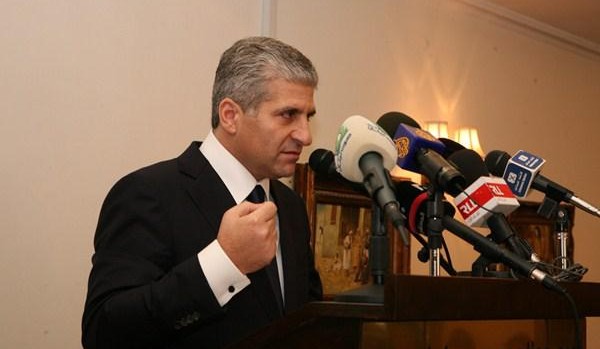
Ahmad Al-Asaad, head of the Lebanese Option party, addresses a press conference in Beirut (Asharq Al-Awsat)
The memory of the day that Hashim Salman, the young man in the picture, died is still fresh. It is only three weeks since he was shot in the stomach at point blank range during a protest outside the Iranian Embassy in Beirut. His killing thrust Lebanese Option, the Shi’te party of which he led the student faction, into the media spotlight for all the wrong reasons. It also highlighted how the escalating sectarian dynamic of the conflict in Syria is spilling over the border into Lebanon. Salman and his fellow party members had gathered at the Iranian Embassy to protest against the Lebanese Shi’ite militia Hezbollah’s involvement in the conflict. Lebanese Option’s leader Ahmad Al-Asaad is convinced that it was a Hezbollah gunman who killed him. Hezbollah have, so far, taken no responsibility for the killing.
In his oak and leather lined office Asaad holds up a smaller photo of Hashim that he keeps in a frame on his desk. “He was like a younger brother to me,” he says. “We’ll miss him. I don’t know if we will find anyone else who was as active as Hashim.” It is in the universities and student communities of Lebanon that the party has found the strongest support for its opposition to Hezbollah and the hold that the party-cum-militia has over the country’s Shi’a communities. But Asaad says he fears the chilling effect that the killing could have on the Lebanese Option Party and its supporters. When he held a press conference at the spot that Hashim died last Sunday, just sixty people showed up.
And yet he is adamant that Hashim’s death has only strengthened his party‘s resolve. “I always saw Hezbollah as the greatest threat to Lebanon,” he says. “The majority of people in this country want a modern and civilised Lebanon that is part of the 21st century. But they don’t want that; they want a Lebanon that is linked to the Iranian regime, for ever.”
Hezbollah’s overt involvement in the Syrian conflict is, says Asaad, a sign of their subservience to their Iranian backers, which overrides any loyalty to the Lebanese people and their interests. “Why do we Lebanese always have to be the pawns that are used by the Iranian regime?” he asks. “Why are their kids allowed to live in peace, but ours aren’t?” And he insists that the ideological support for Hezbollah amongst Lebanon’s Shi’a community is nowhere near as strong as outward appearances might suggest. In 2009 Lebanese Option conducted a study, and concluded that there were at least 37,000 people on Hezbollah’s payroll, each with a family of four or five people. “That explains why tens of thousands of people turn out when they hold a rally,” he says. “It’s because they have to.”
And yet few Lebanese Shi’ites, outside those in the Lebanese Option Party, are willing to speak out against Hezbollah. Asaad says that the silence does not imply respect: instead it is because the militia rule through fear: “There has never in history been a party as oppressive as Hezbollah,” he says. “When you live in a village that is dominated by Hezbollah, and you openly say that you do not agree with them, not only are you called a traitor, a Zionist, an imperialist. You are also called an atheist, which means that your blood becomes halal, and they have the right to kill you.” In such circumstances it takes a brave individual to speak out.
And poverty, too, plays its part. In the destitute Shi’a villages of rural Lebanon or the poor suburbs of south Beirut a wage from Hezbollah will buy loyalty. “If you take a young man who have no job and no education, and you give him a Kalashnikov and tell him, ‘Go and fight these people and at the end of the month you will get $500’, he will do it gladly, and believe any story you tell him. But if you say that to an educated man with a decent life he will tell you to go to hell.” As Shi’a refugees from Syria continue to pour in Lebanon, Asaad claims that they too are being targeted by Hezbollah’s social welfare-based recruitment strategy. “As soon as they know that a refugee is Shi’a they will give him a house and money,” he says.
While it may appear that Hezbollah’s involvement in the Syrian conflict—both inside the country and through its patronage of refugees in Lebanon—is strengthening its support base, Asaad believes that the opposite is true. “Hezbollah now are becoming more oppressive than ever, but their actions in Syria are turning people against them.” And yet for Sunni-Shi’a relations, in both Lebanon and Syria, their involvement is catastrophic, tearing a wound so deep that it will take generations to heal. “Unfortunately the Shi’a in Lebanon have been labelled as a community that is helping Assad in his massacre of the Syrian people,” he says. “They are being put in one basket with Hezbollah which is completely unjust, but because no-one is speaking out against it this is what is in people’s minds. Especially when you see what Hezbollah is doing, celebrating after Qusayr by handing out baklava in the streets of Lebanon.”
Asaad’s solution for weakening Hezbollah’s grip over his sect and his country is, as he admits, a long term project: economic growth and better prospects for the young men and women of the country. “Once the people have able to have a decent life then the fanatics no longer have them in their grip,” he says. “They’re free.” But as the sectarian violence spirals in Syria, and continues to spill over into Lebanon, his dissenting voice seems to be an increasingly lonely one.
